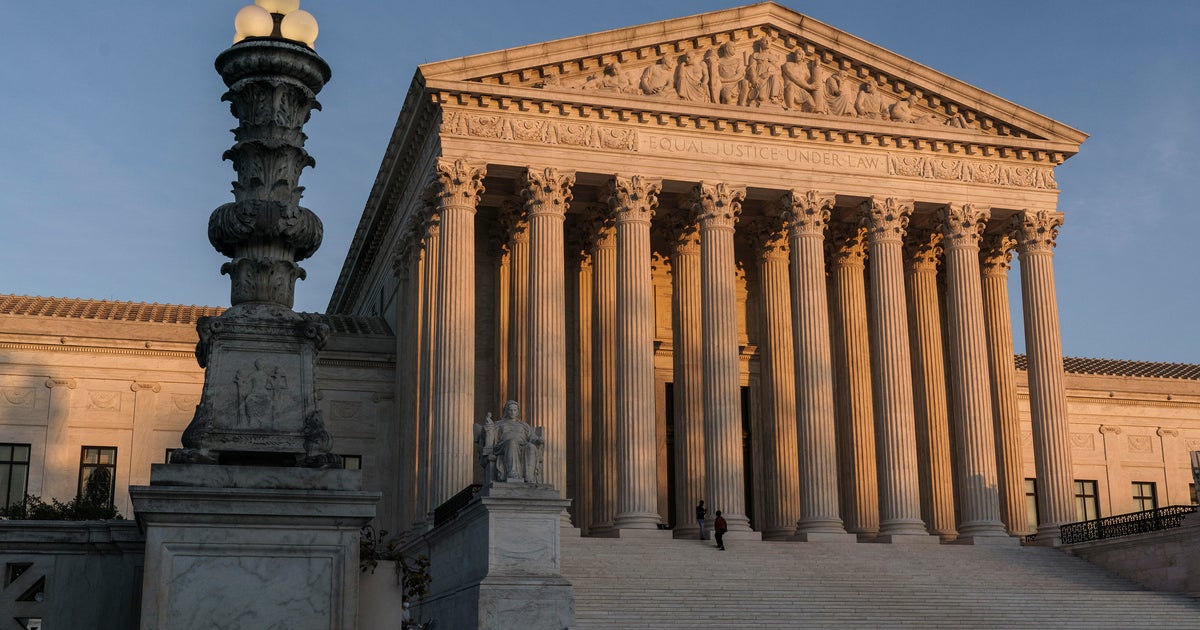/ CBS News
Trump to Arizona for border tour
Washington — The Supreme Court on Thursday agreed to revive an Arizona law requiring documentary proof of citizenship when registering to vote using a state-created form, but declined to allow enforcement of provisions mandating such proof in order to vote for president or by mail.
The split decision from the high court partially rejects an emergency request by the Republican National Committee and GOP state legislative leaders. And while it denied putting in force Arizona’s proof-of-citizenship requirements for casting ballots for president or through the mail, it granted Republicans’ bid to put on hold a federal district court’s order that blocked the rule for those registering to vote while pursuing an appeal.
Justices Clarence Thomas, Samuel Alito and Neil Gorsuch said they would have granted the Republicans’ request in full. But Justices Sonia Sotomayor, Elena Kagan, Amy Coney Barrett and Ketanji Brown Jackson said they would have fully denied it.
Arizona is a key battleground state that could help determine whether Vice President Kamala Harris, the Democratic presidential nominee, or former President Donald Trump, the Republican nominee, wins the White House.
Michael Whatley, chairman of the RNC, said the party has worked to maintain citizenship requirements and see the law enforced to secure elections.
“This is a major victory for election integrity that upholds a simple principle: American elections must be decided by American citizens,” he said in a statement.
Republicans had asked the Supreme Court to issue their requested stay by Thursday, which the secretary of state said was the deadline to resolve litigation affecting what will be printed on Arizona’s ballot. They urged the justices to halt the district court’s injunction to the extent it required Arizona to accept state-provided voter registration applications without documentary proof of citizenship and allow voters who hadn’t proved U.S. citizenship to cast ballots for president or by mail.
Enacted in 2022, Arizona’s voting requirements amended an existing state law that allows residents to register to vote using either a federal form or alternative state-created form.
Under the law, known as HB 2492, people who register to vote using the federal form must provide documentary proof of citizenship if their status cannot be verified by local officials. Registrants who fail to provide such proof are not eligible to vote in presidential elections and cannot receive an early ballot by mail.
The voting measure also tightens restrictions on eligible voters who submit state-provided voter registration forms. Under the law, Arizona election officials must reject state forms that lack proof of citizenship.
Faced with lawsuits from the Biden administration and voting rights groups in 2022, election officials have not enforced the new requirements. The Justice Department and advocacy organizations have argued in part that the National Voter Registration Act overrides the proof-of-citizenship requirement for eligible voters filing the federal form. The groups also claimed that a 2018 consent decree precludes state officials from enforcing the state-form requirement.
In May, the federal district court in Arizona permanently blocked state officials from enforcing the proof-of-citizenship requirements. Republicans appealed to the U.S. Court of Appeals for the 9th Circuit, and a three-judge panel initially agreed to temporarily halt a portion of the district court’s order.
But a separate group of judges assigned to decide the merits of the case put the lower court’s entire injunction back into effect. Republicans then sought emergency relief from the Supreme Court.
In a filing with the court, the RNC and GOP state lawmakers called the district court’s injunction an “unprecedented abrogation of the Arizona legislature’s sovereign authority to determine the qualifications of voters and structure participation in its elections.”
Arizona’s proof-of-citizenship requirement to vote for president or by mail raises questions about the state’s ability to protect its elections, the Republicans argued, and the Constitution does not grant Congress the authority to displace state rules for registering to vote in presidential elections.
“The injunction thwarts the legislature from disallowing individuals who have not proved their U.S. citizenship from participating in Arizona’s selection of its presidential electors or from using Arizona’s generous mail-in voting option,” they said.
The Biden administration urged the Supreme Court to block Arizona’s restrictions on presidential elections and voting by mail, arguing they are preempted by the federal voter registration measure, also known as the “motor voter law.”
Solicitor General Elizabeth Prelogar told the court in a filing that accepting Republicans’ theory that Congress lacks the authority to regulate presidential elections threatens to invalidate not only the National Voter Registration Act, but a slew of other federal election laws that govern presidential elections.
Additionally, Arizona’s top officials, including Attorney General Kris Mayes, a Democrat, oppose a stay of the district court’s order and warned it would be “destabilizing” so close to the November election.
“A stay of the district court’s permanent injunction at this time would contravene the state’s interest in smooth administration of its laws shortly before an election,” state officials wrote.
They warned that the laws, if enforced, would raise difficult questions for state election officials registering to vote using either the federal or state form. If, for example, the Supreme Court allowed enforcement of the proof-of-citizenship requirement to vote in presidential elections, some voters who cast ballots in the primary election in March may not be able to vote for president in the general election in November.
“Bottom line: In this situation, the state’s interests are better served by denying a stay and allowing the normal appellate process to play out,” Arizona officials wrote.
The Arizona dispute is the first involving the 2024 presidential election in which the Supreme Court’s intervention was sought.
Melissa Quinn is a politics reporter for CBSNews.com. She has written for outlets including the Washington Examiner, Daily Signal and Alexandria Times. Melissa covers U.S. politics, with a focus on the Supreme Court and federal courts.


